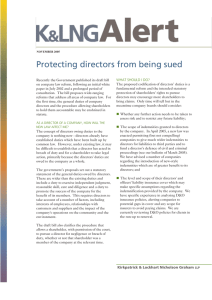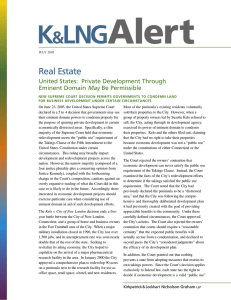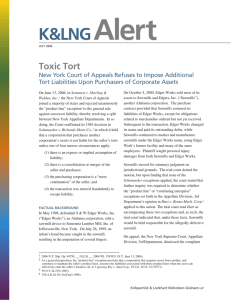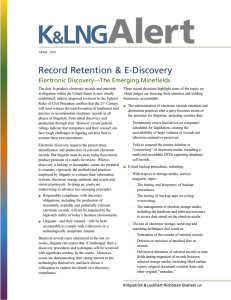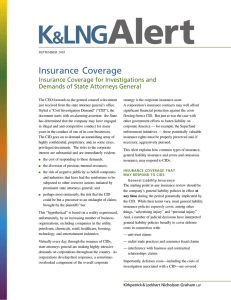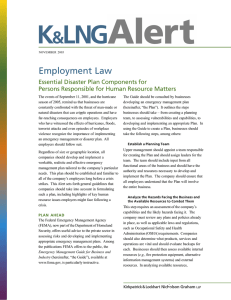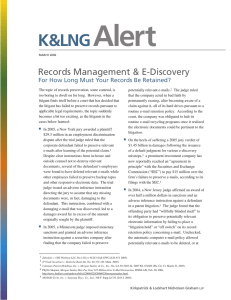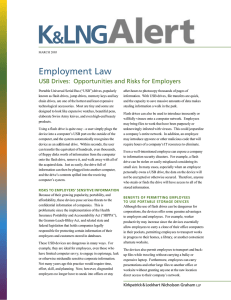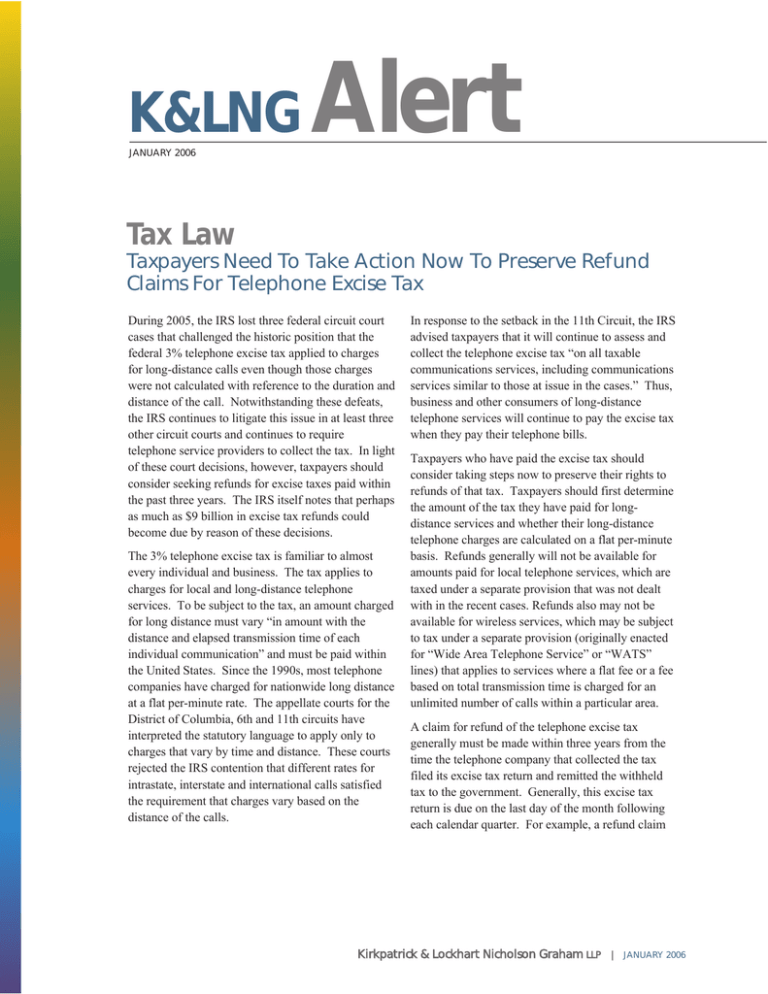
K&LNG
JANUARY 2006
Alert
Tax Law
Taxpayers Need To Take Action Now To Preserve Refund
Claims For Telephone Excise Tax
During 2005, the IRS lost three federal circuit court
cases that challenged the historic position that the
federal 3% telephone excise tax applied to charges
for long-distance calls even though those charges
were not calculated with reference to the duration and
distance of the call. Notwithstanding these defeats,
the IRS continues to litigate this issue in at least three
other circuit courts and continues to require
telephone service providers to collect the tax. In light
of these court decisions, however, taxpayers should
consider seeking refunds for excise taxes paid within
the past three years. The IRS itself notes that perhaps
as much as $9 billion in excise tax refunds could
become due by reason of these decisions.
The 3% telephone excise tax is familiar to almost
every individual and business. The tax applies to
charges for local and long-distance telephone
services. To be subject to the tax, an amount charged
for long distance must vary “in amount with the
distance and elapsed transmission time of each
individual communication” and must be paid within
the United States. Since the 1990s, most telephone
companies have charged for nationwide long distance
at a flat per-minute rate. The appellate courts for the
District of Columbia, 6th and 11th circuits have
interpreted the statutory language to apply only to
charges that vary by time and distance. These courts
rejected the IRS contention that different rates for
intrastate, interstate and international calls satisfied
the requirement that charges vary based on the
distance of the calls.
In response to the setback in the 11th Circuit, the IRS
advised taxpayers that it will continue to assess and
collect the telephone excise tax “on all taxable
communications services, including communications
services similar to those at issue in the cases.” Thus,
business and other consumers of long-distance
telephone services will continue to pay the excise tax
when they pay their telephone bills.
Taxpayers who have paid the excise tax should
consider taking steps now to preserve their rights to
refunds of that tax. Taxpayers should first determine
the amount of the tax they have paid for longdistance services and whether their long-distance
telephone charges are calculated on a flat per-minute
basis. Refunds generally will not be available for
amounts paid for local telephone services, which are
taxed under a separate provision that was not dealt
with in the recent cases. Refunds also may not be
available for wireless services, which may be subject
to tax under a separate provision (originally enacted
for “Wide Area Telephone Service” or “WATS”
lines) that applies to services where a flat fee or a fee
based on total transmission time is charged for an
unlimited number of calls within a particular area.
A claim for refund of the telephone excise tax
generally must be made within three years from the
time the telephone company that collected the tax
filed its excise tax return and remitted the withheld
tax to the government. Generally, this excise tax
return is due on the last day of the month following
each calendar quarter. For example, a refund claim
Kirkpatrick & Lockhart Nicholson Graham LLP |
JANUARY 2006
for taxes that were reported and paid to the
government on January 31, 2003 (i.e., the tax return
that reported taxes paid by the taxpayer during the
final quarter of 2002), must be filed no later than
January 31, 2006. Although the IRS is not expected
to grant a taxpayer’s claim for refund of these taxes
in light of the IRS’s ongoing litigation position, filing
the refund claim would preserve the taxpayer’s right
to these refunds. If the IRS reverses its position and
accepts the results of these recently decided cases, it
may begin to process these refund claims at that
time. A taxpayer should consider initiating refund
litigation in the U.S. Court of Federal Claims or
applicable U.S. District Court if the IRS ignores the
refund claim for 6 months following the filing of the
claim (the earliest point at which such litigation may
be initiated). In addition, a taxpayer generally must
initiate litigation within 2 years of an IRS denial of
the claim to preserve its rights to the refund. The
taxpayer’s claim for refund will be time-barred if it
fails to initiate this litigation within the two-year
period following IRS denial of the claim.
J. Stephen Barge
412-355-8330
or 202.778.9113
sbarge@klng.com
Roger S. Wise
202-778-9023
rwise@klng.com
If you have questions or would like more information about K&LNG’s Tax Law Practice, please contact one
of our lawyers listed below:
PITTSBURGH
BOSTON
Martin S. Allen
Joel D. Almquist
Walter G. Van Dorn
617.261.3212 mallen@klng.com
617.261.3104 jalmquist@klng.com
617.951.9102 wvandorn@klng.com
J. Stephen Barge
412.355.8330 sbarge@klng.com
Alexander Y. Loshilov 412.355.8627 aloshilov@klng.com
Andrew B. Pullman
412.355.8369 apullman@klng.com
W. Henry Snyder
412.355.6720 hsnyder@klng.com
NEW YORK
Jeffrey M. Cole
Scott D. Newman
212.536.4823 jcole@klng.com
212.536.4054 snewman@klng.com
WASHINGTON
Theodore L. Press
202.778.9025 tpress@klng.com
Roger S. Wise
202-778-9023 rwise@klng.com
www.klng.com
BOSTON • DALLAS • HARRISBURG • LONDON • LOS ANGELES • MIAMI • NEWARK • NEW YORK • PALO ALTO • PITTSBURGH • SAN FRANCISCO • WASHINGTON
Kirkpatrick & Lockhart Nicholson Graham (K&LNG) has approximately 1,000 lawyers and represents entrepreneurs, growth and middle market companies, capital
markets participants, and leading FORTUNE 100 and FTSE 100 global corporations nationally and internationally.
K&LNG is a combination of two limited liability partnerships, each named Kirkpatrick & Lockhart Nicholson Graham LLP, one qualified in Delaware, U.S.A. and
practicing from offices in Boston, Dallas, Harrisburg, Los Angeles, Miami, Newark, New York, Palo Alto, Pittsburgh, San Francisco and Washington and one
incorporated in England practicing from the London office.
This publication/newsletter is for informational purposes and does not contain or convey legal advice. The information herein should not be used or relied upon in
regard to any particular facts or circumstances without first consulting a lawyer.
Data Protection Act 1988—We may contact you from time to time with information on Kirkpatrick & Lockhart Nicholson Graham LLP seminars and with our regular
newsletters, which may be of interest to you. We will not provide your details to any third parties. Please e-mail cgregory@klng.com if you would prefer not to
receive this information.
IRS Circular 230 Notice:
To ensure compliance with requirements imposed by the IRS, we inform you that any U.S. federal tax advice contained in this communication (including any
attachments) is not intended or written to be used, and cannot be used, for the purpose of (1) avoiding penalties under the Internal Revenue Code or (2) promoting,
marketing, or recommending to another party any transaction or matter addressed herein.
© 2005 KIRKPATRICK & LOCKHART NICHOLSON GRAHAM LLP. ALL RIGHTS RESERVED.
Kirkpatrick & Lockhart Nicholson Graham
LLP
|
JANUARY 2006



